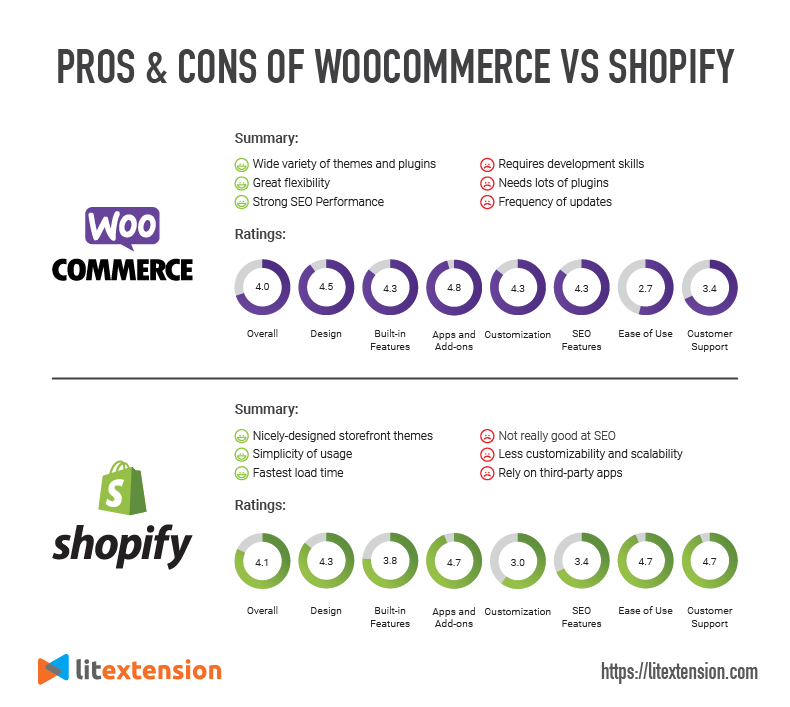Shopify vs. WooCommerce vs. Magento – The Ultimate Showdown
Uncover the battle of the e-commerce giants: Shopify, WooCommerce, and Magento face off in the ultimate showdown for supremacy. E-commerce platforms.
Table of Contents
Hey there, fellow online business enthusiast! Thinking about starting or upgrading your e-commerce store, but not sure which platform to choose? Well, fret not, because I’ve got your back! Today, we’re diving deep into the world of e-commerce platforms, specifically Shopify, WooCommerce, and Magento, to help you make the best decision for your digital storefront. Let’s get started!
Shopify
Let’s kick things off with Shopify, the darling of many small to medium-sized businesses. Shopify is known for its user-friendly interface, making it a breeze for even the least tech-savvy entrepreneurs to set up and manage their online stores.
Find Out Which E-Commerce Platform is Best
Subscribe to our newsletter for exclusive insights and updates.
One of Shopify’s standout features is its built-in tools for marketing and SEO. You can easily optimize your store for search engines and run targeted marketing campaigns without needing to juggle multiple platforms.
With a vast array of customizable themes and apps, Shopify allows you to tailor your store’s look and functionality to suit your brand. Plus, its mobile responsive design ensures that your customers have a seamless shopping experience across devices.
When it comes to pricing, Shopify offers various subscription plans to cater to different business sizes and needs. While there are monthly fees and transaction costs, keep in mind that additional expenses may arise from third-party apps and themes.
Who should consider Shopify? Well, if you’re a small to medium-sized business looking for ease of use and scalability, Shopify could be your perfect match. It’s also ideal for those with limited technical knowledge who want to hit the ground running with their online store.
WooCommerce
Next up, we have WooCommerce, a popular choice among WordPress users looking to turn their websites into fully functional e-commerce stores. WooCommerce offers extensive customization options, allowing you to create a unique online shopping experience for your customers.
One of the perks of WooCommerce is its seamless integration with WordPress. If you’re already familiar with the WordPress platform, you’ll feel right at home managing your online store through WooCommerce.
As an open-source platform, WooCommerce gives you complete control over your e-commerce venture. Whether you’re selling physical products, digital downloads, or services, WooCommerce can accommodate your needs.
While WooCommerce itself is free to use, keep in mind that you’ll incur hosting and domain expenses. Additionally, costs may add up if you opt for premium extensions and themes to enhance your store’s functionality and aesthetic.
Who should give WooCommerce a whirl? If you’re a WordPress user looking for full control over your online store and have a knack for technical aspects, WooCommerce could be the perfect fit. It’s also a great option for businesses that have access to developer resources for further customization.
Looking to revolutionize your online store? Discover which e-commerce platform reigns supreme in this ultimate showdown: [insert link] “Why settle for mediocrity when you can have excellence? Find out which e-commerce platform is right for you in this epic showdown: [insert link]”
Magento
Last but certainly not least, we have Magento, a powerhouse of an e-commerce platform designed for larger enterprises with complex needs. Magento is known for its scalability and robustness, making it a top choice for businesses looking to grow their online presence significantly.

One of Magento’s strong suits is its advanced customization options. Whether you’re looking to implement complex features or tailor your store to unique specifications, Magento has the capabilities to bring your vision to life.
Suitable for large-scale e-commerce operations, Magento offers built-in analytics and reporting tools to help you monitor and optimize your store’s performance. If data-driven decision-making is your forte, Magento has got you covered.
While Magento does offer an open-source version for free, the enterprise version comes with licensing fees. Additionally, be prepared for additional costs related to hosting and ongoing development, especially if you require specialized support.
Who should set their sights on Magento? If you’re a larger enterprise in need of a high level of customization and control over your e-commerce platform, Magento could be the perfect match for you. Just remember that Magento is best suited for businesses with the budget for ongoing maintenance and support.
Find Out Which E-Commerce Platform is Best
Subscribe to our newsletter for exclusive insights and updates.
Conclusion
Phew, that was quite the deep dive into the world of Shopify, WooCommerce, and Magento! So, which e-commerce platform reigns supreme? The answer ultimately depends on your business size, technical expertise, customization needs, and budget.
If you’re a small to medium-sized business looking for a user-friendly and scalable solution, Shopify might be your best bet. For WordPress aficionados seeking complete autonomy over their online stores, WooCommerce could be the way to go. And if you’re a larger enterprise with intricate e-commerce requirements and resources to spare, Magento might be the perfect fit.
Before making your final decision, be sure to research and demo each platform to see which one aligns best with your business goals and aspirations. Remember, the success of your online store hinges on choosing the right e-commerce platform that caters to your unique needs. Happy selling!


